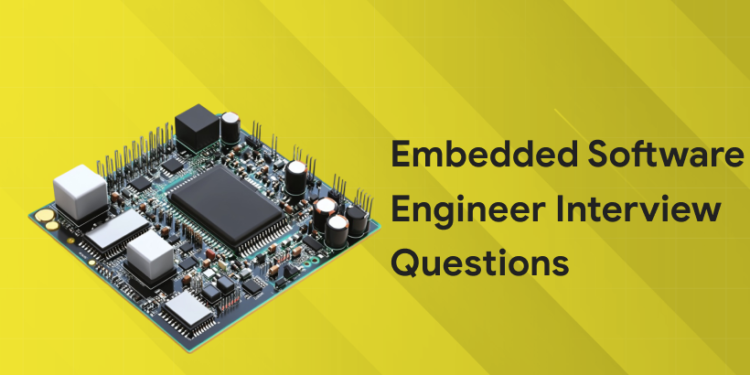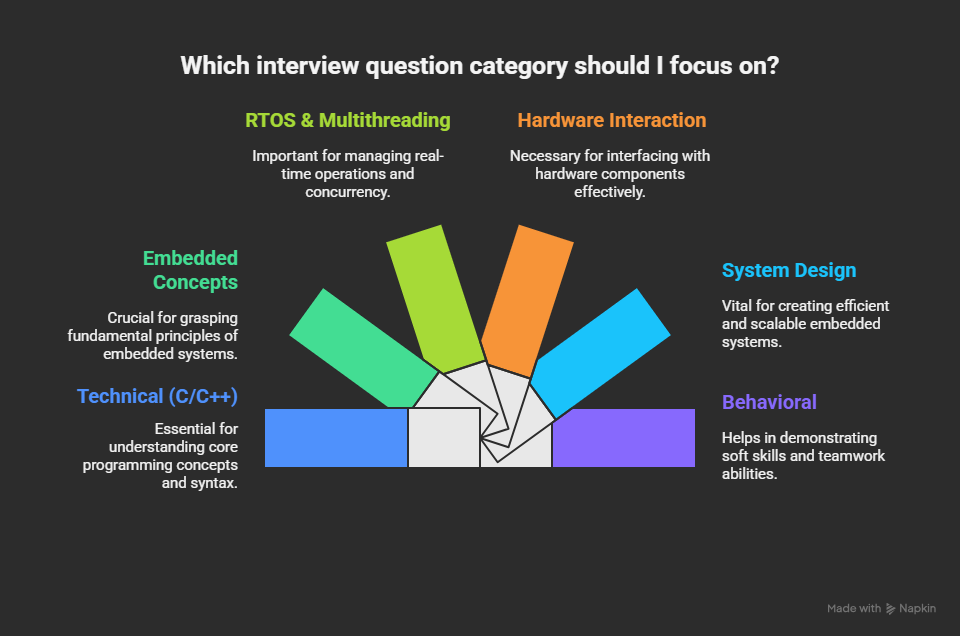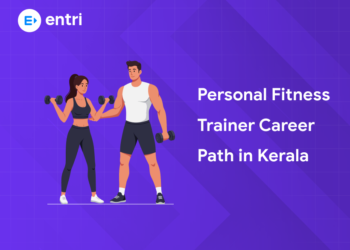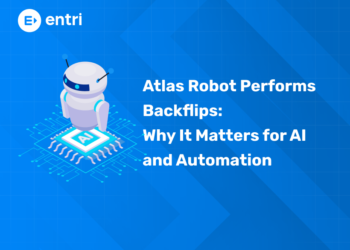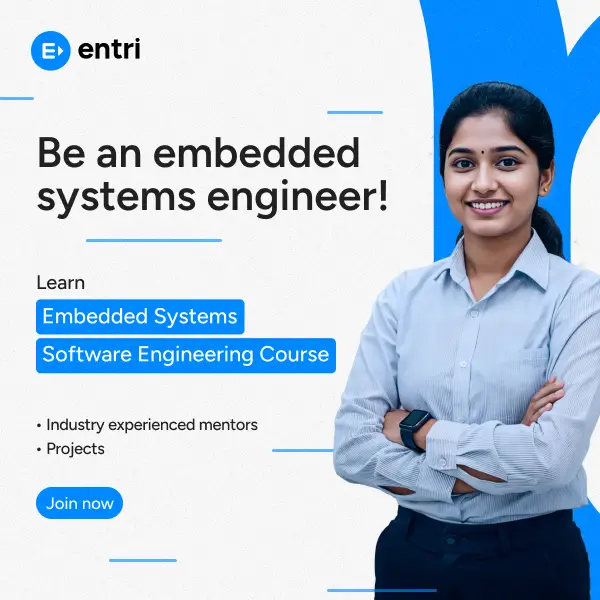Table of Contents
Smart machines are an indispensable part of the present-day world. The role played by embedded software engineers in the design, making and improvement of these machines is quite crucial. It is their effort that builds the bridge that connects software to hardware. There is a huge rise in demand for embedded software engineers in India right now. But to get hired by top firms, you must ace the interview. In this blog, we will discuss a few Embedded Software Engineer Interview Questions to help you achieve that.
Embedded Software Engineer Interview Questions: Introduction
The role of an embedded software engineer is to program computers that are part of a larger system. This could be consumer electronics, automotive systems or even medical devices. Therefore, an embedded software engineer is expected to have a good grasp of the following subjects.
- Hardware-software interaction
- Real-time operating systems (RTOS)
- Low-level programming (especially in C/C++)
In this guide, we will discuss the interview process, areas to prepare and the most common interview questions asked in embedded software engineer interviews. Let us go ahead and learn some Embedded Software Engineer interview questions to ace the next interview.
Interview Rounds Overview
As we said above, knowing just Embedded Software Engineer interview questions is not enough. The first thing to understand is the structure of the interview for the position of embedded software engineers.
| Interview Round | Description | Key Focus Areas | |
| Resume and Background Screening | Initial review of your education, experience, and project work. | · Relevant experience
· Projects and internships · Resume clarity and accuracy |
|
| Online Coding Test | Timed coding challenge assessing programming skills, mostly in C/C++. | · C/C++ syntax and logic
· Data structures & algorithms · Bit manipulation |
|
| Technical Interviews | Core Programming Concepts | Tests C/C++ knowledge, debugging, and optimisation. | · Pointers, memory allocation
· Bitwise operations · Code efficiency |
| Embedded Systems Knowledge | Evaluates understanding of real-time and resource-constrained systems. | · Memory segments
· Startup code · Bare-metal vs RTOS |
|
| Microcontroller/Hardware Interaction | Checks the ability to interface software with hardware components. | · GPIO, UART, I2C, SPI
· Register-level programming · Peripheral configuration |
|
| RTOS and Real-Time Concepts | Assesses knowledge of multitasking in constrained environments. | · Task scheduling
· Semaphores and mutexes · Priority inversion |
|
| Hardware Interaction Round (Optional) | Practical or theoretical test on low-level hardware debugging. | · Oscilloscopes, logic analysers
· Signal timing · Real-time debugging |
|
| System Design/Architecture Round | Evaluates system-level thinking and embedded architecture planning. | · Firmware architecture
· Communication protocols · Design trade-offs |
|
| HR/Behavioural Round | Final assessment of cultural fit, communication skills, and soft skills. | · Teamwork and leadership
· Conflict resolution · Career goals |
|
Master Embedded Systems Programming!
Launch your tech career with our Embedded Systems Course in Kerala, designed for hands-on learning and industry readiness.
Know MoreKey Areas to Prepare
There are some key concepts that you have to learn in depth to achieve good scores and create a good impression on recruiters in your interview round.
Take a look at the table below to understand this better.
| Area | Description | Examples / Topics |
| Programming Languages | Core language skills required for embedded development. | · C and C++ basics
· Pointers · Memory management · Bitwise operations |
| Embedded C | Specialised C is used in embedded systems for low-level hardware interaction. | · Register manipulation
· Memory-mapped I/O |
| Microcontrollers and Peripherals | Knowledge of interfacing software with hardware components. | · GPIO
· UART · I2C · SPI · Timers · ADC/DAC |
| RTOS Concepts | Understanding of real-time operating systems used in embedded systems. | · Task scheduling
· Context switching · Semaphores · Mutexes |
| Memory Management | Efficient use of limited memory in embedded devices. | · Heap vs Stack
· Memory leaks · Fragmentation |
| Interrupts | Handling external/internal events in a responsive way. | · ISR design
· Interrupt latency · Priority handling |
| Low-level Debugging Tools | Tools used for hardware-level testing and debugging. | · JTAG
· Oscilloscopes · Logic analyzers |
| Communication Protocols | Understanding of how devices communicate within systems. | · CAN
· MODBUS · BLE · Ethernet |
| Operating Systems (if applicable) | For embedded Linux-based roles, OS-level knowledge is critical. | · Linux device drivers
· Kernel modules |
| Coding and Problem Solving | General algorithmic and logical problem-solving ability. | · Arrays, trees, stacks
· Searching/sorting algorithms |
| Version Control & Build Systems | Tools for managing code and automating builds. | · Git
· Makefiles · CMake |
You can learn all these key topics if you supplement your learning with an online course that helps you specialise in embedded software engineering. One of the best courses in embedded software engineering is offered by the Entri Elevate platform.
Learn embedded software engineering from expert mentors! Join Entri Elevate now!
Most Asked Interview Questions
Some of the most asked Embedded Software Engineer interview questions will be discussed in this section.
| Category | Question | What It Assesses |
| Technical (C/C++) | What is the difference between volatile and const volatile? | Understanding of volatile keywords and their implications in embedded systems |
| How do you prevent memory leaks in C? | Dynamic memory management and best practices | |
| What are the different memory segments in C? | Knowledge of stack, heap, BSS, data, and text segments | |
| How does a function call work in terms of the stack? | Call stack behaviour, activation records, return address | |
| Write a circular buffer implementation in C. | Data structures and implementation skills | |
| Embedded Concepts | What is an ISR? Can you call a normal function from an ISR? | ISR limitations and design principles |
| How do you debounce a switch in hardware/software? | Practical experience with noisy signals | |
| Explain the differences between polling and interrupts. | Efficiency trade-offs and real-time responsiveness | |
| What happens when you dereference a NULL pointer? | Defensive programming, error handling | |
| Explain the use of watchdog timers. | Fault recovery and system reliability | |
| RTOS & Multithreading | What is the difference between a mutex and a semaphore? | Synchronisation primitives and their use cases |
| How does priority inversion occur, and how is it handled? | Real-time scheduling issues and mitigation strategies | |
| What is a deadlock, and how can it be avoided? | Concurrency control, system stability | |
| Hardware Interaction | How would you configure and use a UART interface? | Peripheral configuration and serial communication |
| How does I2C differ from SPI? | Protocol differences and application suitability | |
| System Design | Design a firmware architecture for a wearable health monitoring device. | Systems thinking, modularity, scalability |
| How would you handle firmware updates over the air (OTA)? | Security, reliability, and update mechanisms | |
| Behavioral | Tell us about a time you debugged a complex issue. | Problem-solving and analytical thinking |
| How do you manage tight deadlines in embedded projects? | Time management, prioritisation, and teamwork |
Tips to Crack the Interview
Now that you have learned a few commonly asked Embedded Software Engineer interview questions, it is time to look at some other interview tips that will help achieve success in interview rounds.
| Tip | Key Points |
| Master C/C++ | · Practice pointers and memory handling
· Use bitwise operators · Learn arrays, structs, and linked lists |
| Understand Hardware | · Interact with registers and memory-mapped I/O
· Use UART, SPI, I2C, GPIO |
| Read Datasheets | · Extract timing, voltage, and register info
· Configure peripherals based on specs |
| Hands-On Practice | · Build projects on STM32, Arduino, or Pi
· Write and debug embedded drivers |
| Be Curious | · Ask about constraints and trade-offs
· Understand system-level decisions |
| Practice Problem Solving | · Solve C/C++ problems on LeetCode or HackerRank
· Focus on logic and efficiency |
Master Embedded Systems Programming!
Launch your tech career with our Embedded Systems Course in Kerala, designed for hands-on learning and industry readiness.
Know MoreResources to Prepare
Some resources that will help you prepare for answering Embedded Software Engineer interview questions are discussed below.
| Category | Resources |
| Books | · Embedded C Programming – Michael J. Pont
· The Art of Designing Embedded Systems – Jack Ganssle · Programming Embedded Systems in C and C++ – Michael Barr |
| Online Courses | Embedded Software Engineering Course by Entri |
| Websites | · Embedded.com
· Stack Overflow · Embedded section · GitHub · Open-source embedded projects |
| Communities | Reddit: r/embedded
EEVblog Forums |
Learn key skills to become an embedded software engineer! Click here to register in Entri!
Embedded Software Engineer Interview Questions: Final Thoughts
Passing an interview round in the recruitment drive for embedded software engineers is difficult. But it is not impossible. You just need the following skills:
- Programming expertise
- Real-time systems understanding
- Practical debugging skills
One must have a good understanding of the tools needed and focus on problem-solving and gaining as much hands-on experience as possible. You cannot excel in this job role just by writing code; you need to understand the real-world constraints of the system they are dealing with. This blog has given you a few Embedded Software Engineer Interview Questions. All you have to do is find appropriate answers and practice.
Master Embedded Systems Programming!
Launch your tech career with our Embedded Systems Course in Kerala, designed for hands-on learning and industry readiness.
Know MoreFrequently Asked Questions
Is C++ used in embedded systems?
Yes, C++ is increasingly being used, especially in larger systems. However, C remains dominant for low-level programming due to its predictability.
Should I know Linux for embedded systems?
It depends on the role. For bare-metal or MCU-based roles, no. For embedded Linux jobs, yes.
Do I need to know assembly language?
Not mandatory, but having a basic understanding can help in performance optimisation and debugging.
How important are RTOS skills?
Very important if you’re applying for mid to senior-level roles or working on time-critical systems.
Are personal projects helpful?
Absolutely. Projects on Arduino, STM32, or Raspberry Pi can showcase practical knowledge and initiative.


